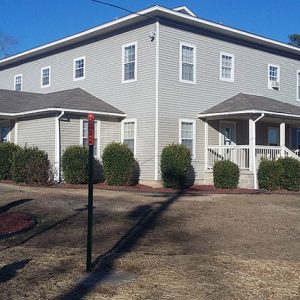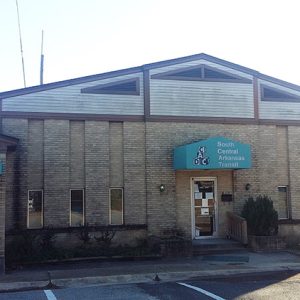calsfoundation@cals.org
Central Arkansas Development Council
The Central Arkansas Development Council (CADC) was developed in direct response to the Economic Opportunity Act, which was signed into law by President Lyndon B. Johnson on August 20, 1964. Part of Johnson’s “War on Poverty,” CADC was created to “alleviate the causes and conditions of poverty” for central Arkansas residents. CADC’s focus is to help low-income individuals and their families become self-sufficient. To that end, CADC provides food, job training, affordable housing, transportation, and financial literacy to low-income individuals and families in central Arkansas. CADC’s Senior Activity Centers provide social activities and meals to people over the age of sixty. In the twenty-first century, CADC’s service area includes twelve Arkansas counties: Montgomery, Pike, Clark, Hot Spring, Dallas, Ouachita, Calhoun, Columbia, Union, Saline, Pulaski, and Lonoke.
On January 8, 1964, President Johnson presented his first State of the Union Address before Congress in Washington DC. In his speech, Johnson declared an “unconditional war on poverty in America.” Johnson called poverty a national problem that could be solved through local and state agencies created to address poverty by providing education, job training, and other services to the country’s poorest citizens. Through the Federal Office of Economic Opportunity (OEO), community action programs and agencies were created to implement the provisions of the Economic Opportunity Act.
The Office of Economic Opportunity provided funds necessary to establish vocational training programs such as JobCorps; the Volunteers in Service to America (VISTA), a domestic version of the Peace Corps; and the Head Start education program. The OEO’s first director was Sargent Shriver, founder of the Peace Corps and “commanding general of the War on Poverty.” CADC is one of many Community Action Agencies in Arkansas. Others include the Pine Bluff Jefferson County Economic Opportunities Commission, Inc. (PBJCEOC), Southeast Arkansas Community Action Corp. (SEACAC), Southwest Arkansas Development Council, Inc. (SWADC), Arkansas River Valley Area Council, Inc. (ARVAC), Crawford-Sebastian Community Development Council, Inc. (CSCDC), Economic Opportunity Agency of Washington County (EOAWC), the Office of Human Concern, Inc. (OHC), Ozark Opportunities, Inc. (OOI), Northcentral Arkansas Development Council, Inc. (NADC), Black River Area Development Corp. (BRAD), Crowley’s Ridge Development Council, Inc. (CRDC), Mississippi County Arkansas Economic Opportunity Commission, Inc. (MCAEOC), and the Mid-Delta Community Services, Inc. (MDCS). Each is a member of the Arkansas Community Action Agencies Association, Inc.
In 1965, Central Arkansas Development Council was formed as a privately run nonprofit corporation. CADC was recognized by the OEO as a Community Action Agency in November 1965. At that time, it serviced only Saline and Hot Spring counties. CADC received its first grant that year and set about developing the organization, planning services, identifying target areas, and putting together its board of directors. The board was set up for equal representation: one-third came from government agencies, one-third came from private concerns, and one-third was made up of low-income people.
Job training and education were CADC’s first programs. In early 1966, CADC sought to create a program to work with rural school districts to identify low-income students and secure resources to help them. Also, the Medicare Alert system was set up to enroll people over the age of sixty-five in Medicare. Another goal that year was to create an in-school work-study program to help students find jobs. A grant from the OEO, approved effective on June 1, 1966, created the Head Start preschool programs that operated in Saline and Hot Spring counties.
By 1967, CADC’s funding was reportedly $300,000 per year. Its programs at that time included Neighborhood Service Centers, Head Start, and Neighborhood Youth Corps. CADC’s new administration offices were in Benton (Saline County) and in Malvern (Hot Spring County). Head Start programs began first in Malvern and Benton in 1967. In Benton, the first location was the old Gene Moss Building at Tyndall Park, but after 1968, when Ralph Bunche Elementary School closed due to integration, the former school became Head Start. In 1969, Clark County was added to CADC’s service area. In the 1970s, CADC expanded its list of programs to include more than job training and educational services. By then, it had built its first Senior Adult Centers and started several other programs such as community food and nutrition programs, public transportation, family planning, energy assistance, weatherization, alcohol abuse treatment, and housing assistance. Benton’s Charles F. Cunningham Sr. became CADC director in 1971.
In 1973, CADC began the first Section 8 housing program in Saline County, which later came to be run by the City of Benton. Between 1974 and 1979, Senior Adult Centers were built in all counties, including Pike and Montgomery. At that time, the board was set at twenty-four members: six each from Saline, Hot Spring, and Clark counties, and three each from Pike and Montgomery counties. In 1975, CADC’s South Central Arkansas Transit (SCAT) bus system became of the state’s first program to be nationally funded as a Section 147 demonstration program. In 1976, the Men’s Alliance purchased the Ralph Bunche School property in Benton for $8,001.50 and requested that CADC pay an annual rent of $4,000. Director Cunningham rebuffed the request and threatened to move the school elsewhere. For the first seven years, CADC paid no rent on the building.
In 1980, Pike and Montgomery counties were officially added to CADC’s service area. In 1982, the Home-Health Program was created to provide in-home healthcare by RNs, LPNs, and certified home-health aides. CADC began its Project Independence initiative in 1985 to help move people off welfare, well before the Family Support Act was passed by Congress in 1988. In 1987, the Job Training Partnership Act was passed by Congress. CADC began its Job Training Partnership Act tutoring program that year, which allowed public school teachers to provide tutoring and remedial education to local youth. CADC’s JTPA Youth Competency Program for at-risk youth and high school drop-outs began in 1989. Also in 1989, CADC’s SCAT began participating in Greyhound’s Rural Connection Program. Through this initiative, SCAT played a vital role in developing the Arkansas Transit Association.
In the 1990s, the CADC board was reduced to just fifteen members, and an employee scholarship program was implemented, as well as an internal training program to make CADC staff more sensitive to customer needs. In 1996, on orders from the state, CADC became caretaker for services in Union, Ouachita, Calhoun, Dallas, and Columbia counties. In 1997, the state made CADC caretaker for the Head Start programs in Cross, Crittenden, Lee, Woodruff, and St. Francis counties in eastern Arkansas.
By October 1999, both Pulaski and Lonoke were officially added to CADC’s service area, bringing its service to twelve counties. CADC began administering the Emergency Food and Shelter National Board Program and serving as fiscal agent in some of those counties. CADC also began sharing office space with the Transitional Employment Agency (TEA) Coalition Coordinator and Saline County Habitat for Humanity.
In 2003, Larry Cogburn became executive director of CADC after Cunningham stepped down to serve as an alderman for Benton’s second ward. In 2018, CADC’s programs included early childhood education, elder services, nutrition, energy assistance, housing, weatherization, transportation, planning and development, consumer services, case management, and advocacy. In 2011, CADC received a grant from the American Recovery and Reinvestment Act of 2009 that financed the purchase and renovation of 321 Edison Avenue in Benton, which houses CADC’s main administration offices. In addition, Saline County acquired two Head Start schools at Harmony Grove and Shannon Hills.
For additional information:
Central Arkansas Development Council. http://cadc.com/ (accessed July 12, 2018).
Cody Lynn Berry
Benton, Arkansas
 Civil Rights and Social Change
Civil Rights and Social Change Divergent Prosperity and the Arc of Reform, 1968–2022
Divergent Prosperity and the Arc of Reform, 1968–2022 Central Arkansas Development Council
Central Arkansas Development Council  Central Arkansas Development Council
Central Arkansas Development Council 




Comments
No comments on this entry yet.